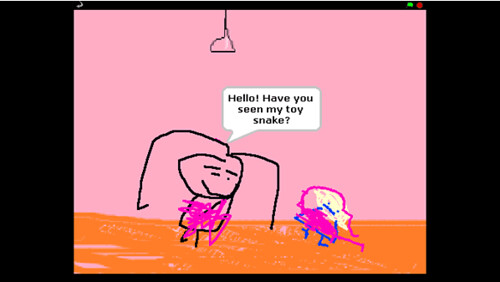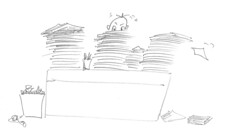If you’re concerned that young children won’t be able to grasp computing concepts, or are worried about how you’re going to teach it, have a look around the Literacy from Scratch website.
Managed – and, I think, written by – Lawrence Williams, the website contains examples of pupils’ work in Scratch, cross-curricular ideas and examples, and notes on pedagogy. I’ve only had a quick look at the site, hence the title of this article, but I’m impressed not only by the range of resources but the fact that the emphasis seems to be mainly on creativity. It’s always good to have a reason for doing something!
 Example of a stry created in Scratch by a primary school pupil
Example of a stry created in Scratch by a primary school pupil
There are examples of schemes of work too, and notes about how Scratch is taught in Prague. The research and international aspects are to be expected, given that Williams is a Senior Fellow and World Peace Ambassador of MirandaNet, the research-focused organisation for teachers and others.
There is a new book out too, called “Introducing Computing: A Guide for Teachers”, edited by Lawrence Williams:
Again, I haven’t read this yet, but it seems useful and timely. As well as including practical ways to develop children’s Computing skills alongside creative writing, art and music, according to the blurb on Amazon “the book examines different approaches to introducing children from age 5 to Computing”.
It contains chapters by members of Naace and Mirandanet. I recognise most of the names, and on that basis alone I think the book is promising.
You can buy the book by clicking on the image of the book cover shown, and if you do I will receive a small commission from Amazon, which I trust will give you a warm glow from doing such a good deed :-)
Your newsletter editor is hard at work sifting through the submissions for Digital Education, the free newsletter for education professionals. Have you subscribed yet?
The Early July 2014 edition was a special coding issue, with loads of resources listed. That’s still available to subscribers.
Read more about Digital Education, and subscribe, on the Newsletter page of the ICT in Education website.
We use a double opt-in system, and you won’t get spammed.
I have added a little more informaiton about the book.
Just a quick update: I was right: Lawrence did write the website -- and Francis Howlett, a key person in Mirandanet, organised the material.

